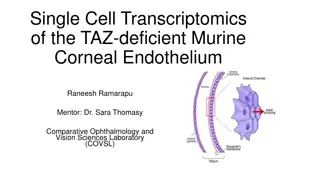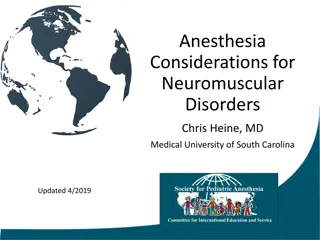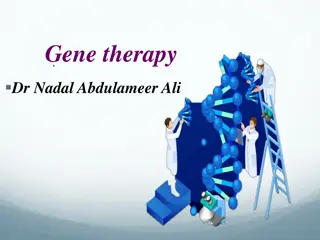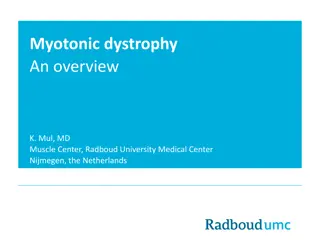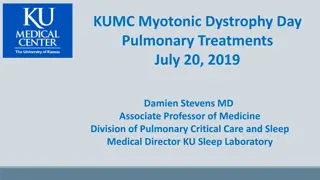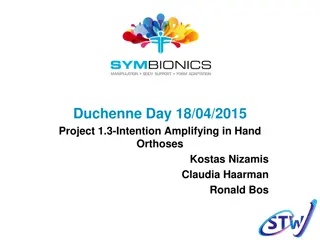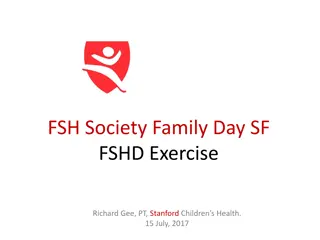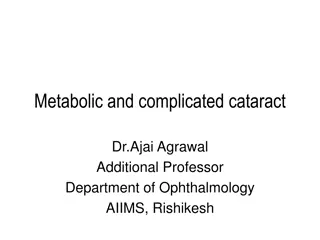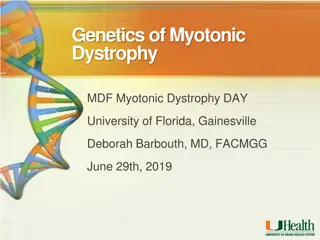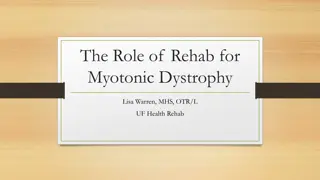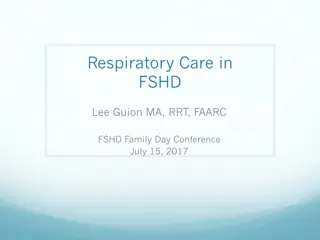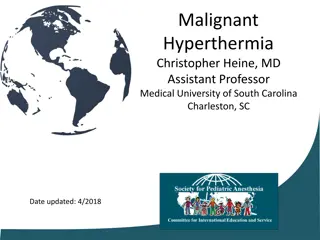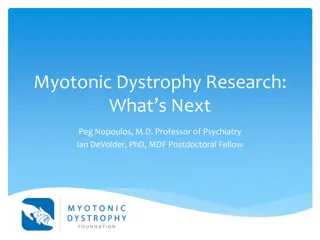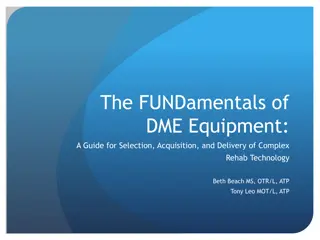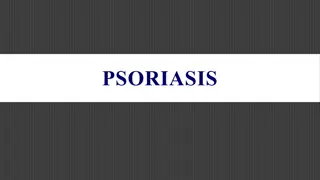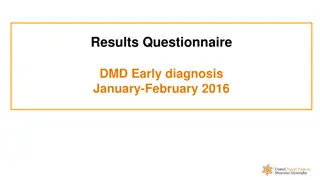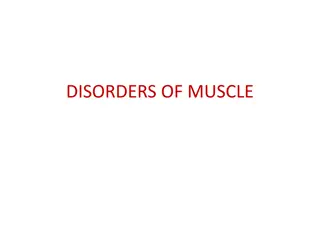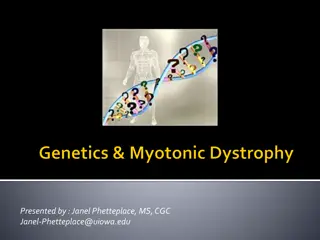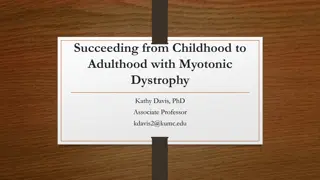Single-Cell Transcriptomics of TAZ-Deficient Murine Corneal Endothelium
This study explores the single-cell transcriptomics of TAZ-deficient murine corneal endothelium in the context of Fuchs Endothelial Corneal Dystrophy (FECD), a polygenic disease affecting millions globally. The research utilizes a TAZ-deficient mouse model to mimic late-onset FECD, revealing reduced
2 views • 39 slides
Anesthesia Considerations for Neuromuscular Disorders: Overview and Management
This informative document discusses the classification of neuromuscular disorders, focusing on muscle and muscle membrane disorders such as Muscular Dystrophy. It delves into the characteristics, pathology, and clinical presentations of different types of muscular dystrophies, including Duchenne and
0 views • 42 slides
Understanding Gene Therapy: Types, Techniques, and Applications
Gene therapy involves introducing DNA into a patient to treat genetic diseases by correcting disease-causing mutations. There are two types of gene therapy: somatic gene therapy and germline gene therapy, each with different implications. Techniques such as gene augmentation therapy and gene inhibit
1 views • 15 slides
Understanding Myotonic Dystrophy: A Comprehensive Overview
Myotonic dystrophy is a multisystem genetic disorder that can affect individuals at different stages of life, from infants to adults. It presents with various symptoms such as muscle weakness, myotonia, cognitive and behavioral issues, respiratory problems, and more. The disease progression and mani
0 views • 38 slides
Pulmonary and Sleep Management in Myotonic Dystrophy
Myotonic dystrophy presents challenges in respiratory and sleep function. The condition can lead to pulmonary complications, such as ineffective cough, pneumonia, and respiratory failure, making proactive management crucial. Treatment strategies include vaccinating against infections, utilizing vent
0 views • 10 slides
Innovative Hand Orthosis Development for Duchenne Muscular Dystrophy Patients
Develop an intuitive hand orthosis to support individuals with Duchenne Muscular Dystrophy (DMD). The project aims to enhance active hand support through high-tech, multi-DOF orthoses designed by a team of researchers focusing on control strategies, functional development, and integration with exist
0 views • 9 slides
Understanding Exercise Considerations for FSHD Patients: Research and Therapeutic Insights
Explore the significance of exercise for individuals with Facioscapulohumeral Muscular Dystrophy (FSHD) through research findings and therapeutic strategies. Delve into topics like active aging, functional capacity, cognitive-behavioral therapy effects, and more to optimize health and well-being for
0 views • 20 slides
Understanding Metabolic and Complicated Cataracts: Classification and Subtypes
Explore the etiological classification of cataracts, focusing on metabolic and complicated types such as diabetic cataracts, galactosemia-related cataracts, myotonic dystrophy-related cataracts, and hypocalcaemic cataracts. Learn about distinct morphological subtypes, pathophysiology, and specific c
0 views • 31 slides
Understanding Myotonic Dystrophy: Genetics & Inheritance Insights
Explore the genetic basis of Myotonic Dystrophy, including trinucleotide repeat expansions in the DMPK and CNBP genes, leading to impaired gene function and symptoms. Learn about autosomal dominant inheritance and the phenomenon of anticipation in symptom severity.
0 views • 15 slides
Comprehensive Approach to Rehab for Myotonic Dystrophy
Using a client-centered and multidisciplinary approach, rehabilitation for Myotonic Dystrophy focuses on addressing personal factors, physical therapy, occupational therapy, and enhancing mobility. The rehab team aims to improve health outcomes and quality of life by addressing personal care, mobili
0 views • 19 slides
Respiratory Care in FSHD: Guidelines and Management Overview
Comprehensive overview of respiratory care in Facioscapulohumeral Muscular Dystrophy (FSHD) based on the American Academy of Neurology guidelines. Covers incidence of respiratory insufficiency, assessment of lung function, treatment options including noninvasive ventilation, and strategies for maint
0 views • 16 slides
Understanding Malignant Hyperthermia: Causes, Management, and Epidemiology
Malignant Hyperthermia (MH) is a genetic disorder of skeletal muscle triggered by certain anesthetics, leading to a hyper-metabolic state. The uncontrolled release of calcium results in muscle rigidity, metabolic acidosis, hyperthermia, and other serious complications. MH was first described in the
0 views • 24 slides
Understanding Research Studies in Myotonic Dystrophy
Delve into the world of Myotonic Dystrophy research through this informative content, exploring different types of research studies, phases of drug trials, and the importance of informed consent. Learn about observational and interventional studies, drug trial phases, and the intricate process invol
0 views • 17 slides
Understanding Durable Medical Equipment (DME) and Complex Rehab Technology (CRT)
Durable Medical Equipment (DME) must meet specific criteria to be considered eligible for use, primarily for medical reasons in the home setting. Complex Rehab Technology (CRT) includes specialized mobility devices for individuals with various conditions such as spinal cord injury, cerebral palsy, a
0 views • 44 slides
Understanding Psoriasis: Causes, Types, and Symptoms
Psoriasis is a chronic, multifactorial skin condition characterized by papulosquamous eruptions caused by abnormalities in arachidonic acid metabolism and skin cell immunity. It is believed to have a genetic component and results in various types of lesions like chronic plaque, guttate, flexural, an
0 views • 10 slides
Insights from DMD Early Diagnosis Questionnaire - January & February 2016
Detailed findings from a questionnaire on Duchenne Muscular Dystrophy (DMD) early diagnosis in various countries: average age of DMD diagnosis, medical programs for young children, first person to detect issues, duration between concerns and diagnosis, diagnosis makers, parental information receptio
0 views • 11 slides
Overview of Muscle Disorders and Muscular Dystrophies
The human body consists of over 600 muscles, divided into skeletal, smooth, and cardiac muscles. Diseases of skeletal muscle encompass myopathy, myositis, and muscular dystrophy. Muscle disorders are categorized into genetic muscular dystrophies, channelopathies, inflammatory myopathies, and endocri
0 views • 32 slides
Genetics and Inheritance: Insights and Options for Families
Explore the world of genetics and inheritance through a series of informative slides covering topics such as Myotonic Dystrophy, autosomal dominant inheritance, biological children donation/adoption, prenatal diagnosis, and preimplantation genetic diagnosis. Gain insights into genes, chromosomes, an
0 views • 14 slides
Navigating Myotonic Dystrophy from Childhood to Adulthood: Insights and Guidance
Understanding the journey of individuals with Myotonic Dystrophy through education laws like IDEA and Section 504, focusing on transition, support services, and essential categories and concepts. Explore how Individualized Education Programs (IEP) and Section 504 cater to academic needs, ensuring eq
0 views • 23 slides
